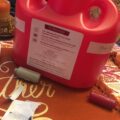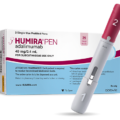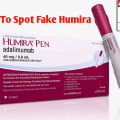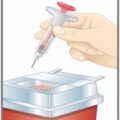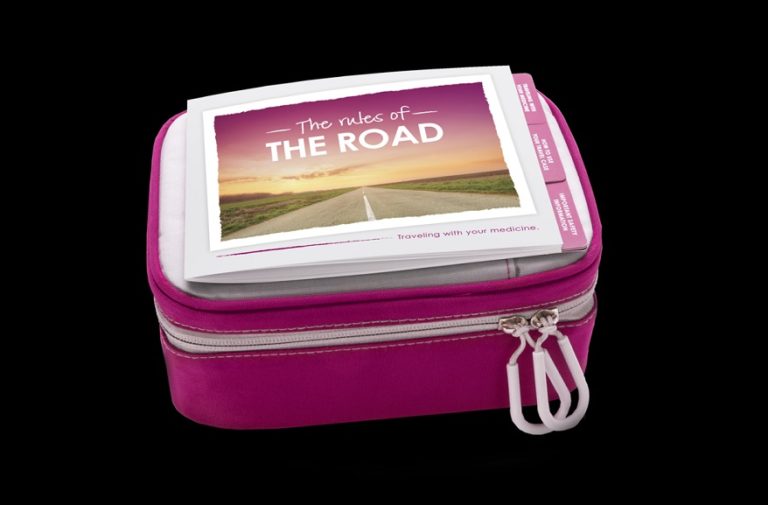
Humira is a brand-name prescription medication. It’s FDA-approved to treat several conditions. Humira contains the active drug adalimumab, which is a biologic medication. Biologics are medications made from living cells. Adalimumab belongs to a class of medications known as tumor necrosis factor (TNF) blockers. (A class of medications is a group of drugs that work in a similar way.) TNF is a protein made by your body. In clinical studies, Humira was effective.
Humira comes in three forms: a single-dose pen, a single-dose prefilled syringe, and a single-dose vial of liquid solution. To learn the strengths of the forms, see the “Humira dosage” section below. The drug is given as an injection just under your skin (subcutaneous). A healthcare provider can give you Humira injections. But you may be able to give yourself injections at home with the pen or syringe if your doctor approves. You’d need to be trained first. The vial form of Humira can be used only by healthcare providers. You won’t be able to use vials yourself.
How To Travel With Humira Pen
Traveling itself, whether it’s a business trip or vacation, can be stressful. Adding to this endeavor, the need to have your drugs always cooled at +2°C to +8°C makes it even harder. As a helping hand, this travel guide will lead you through the steps how to travel with Humira Pen.
Keep Humira in the outer carton until it is time to use it. Humira must be kept in the refrigerator (2- 8°C) but don’t allow it to freeze. If you are travelling, a single Humira pre-filled pen or pre-filled syringe may be stored at room temperature (below 25°C) for a maximum period of 14 days, but it must be protected from light. Once removed from the refrigerator for room temperature storage, the syringe or pen must be used within 14 days or discarded even if it is returned to the refrigerator. If additional syringes or pens are being carried, they should be refrigerated (kept between 2-8°C).
When planning to travel overseas, it is important that you:
- talk to your doctor about travelling with Humira
- carry a letter from your doctor detailing what Humira is, how much you will be taking, and stating that it is for your own personal use
- leave Humira in its original packaging so it is clearly labelled with your name and dosage instructions (if you are taking Humira pens/syringes with you)
- You should carry your Humira with you as hand luggage onto the airplane. Confirm with the airline about carrying Humira on the plane and through customs
- Keep Humira at the correct storage conditions outlined above
Join AbbVie Care online or call 0800 848 243 and you’ll receive an ice pack and be able to order a travel case.
What are some things I need to know or do while I take Humira Pen?
- Tell all of your health care providers that you take Humira Pen (adalimumab prefilled pens and syringes). This includes your doctors, nurses, pharmacists, and dentists.
- You may have more chance of getting an infection. Wash hands often. Stay away from people with infections, colds, or flu.
- If you have had hepatitis B before or carry the virus, talk with your doctor. Drugs like this one can cause the virus to become active. This can lead to very bad and sometimes deadly liver problems.
- Hepatitis B testing needs to be done as you were told by the doctor. Talk with the doctor.
- You may bleed more easily. Be careful and avoid injury. Use a soft toothbrush and an electric razor.
- Make sure you are up to date with all your vaccines before treatment with Humira Pen (adalimumab prefilled pens and syringes).
- Talk with your doctor before getting any vaccines. Use of some vaccines with Humira Pen (adalimumab prefilled pens and syringes) may either raise the chance of an infection or make the vaccine not work as well.
- Do not get a weakened bacteria like BCG for bladder cancer while you use Humira Pen (adalimumab prefilled pens and syringes). Talk with your doctor.
- Have blood work checked as you have been told by the doctor. Talk with the doctor.
- If you have a latex allergy, talk with your doctor. Some products have latex.
- If you have sunburn or other skin problems, talk with your doctor.
- Have your skin checked. Tell your doctor if you have any skin changes like a new wart, skin sore or reddish bump that bleeds or does not heal, or a change in the color or size of a mole.
- Rarely, people using drugs like this one have had nervous system problems. Sometimes, these problems have not gone away. Call your doctor right away if you have a burning, numbness, or tingling feeling that is not normal; change in eyesight; dizziness; seizures; or weakness in your arms or legs.
- Unsafe blood cell count problems have happened, like aplastic anemia and a type of low white blood cell count. Tell your doctor right away if you feel very tired or weak, or have a fever, chills, shortness of breath, any unexplained bruising or bleeding, or purple “splotches” on your skin.
- If you are 65 or older, use Humira Pen (adalimumab prefilled pens and syringes) with care. You could have more side effects.
- Use with care in children. Talk with the doctor.
- Tell your doctor if you are pregnant, plan on getting pregnant, or are breast-feeding. You will need to talk about the benefits and risks to you and the baby.
- If you used Humira Pen (adalimumab prefilled pens and syringes) when you were pregnant, tell your baby’s doctor. Read: How to Spot Fake Humira Pen

